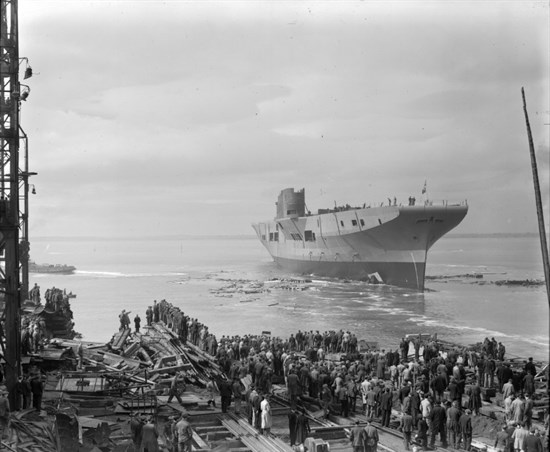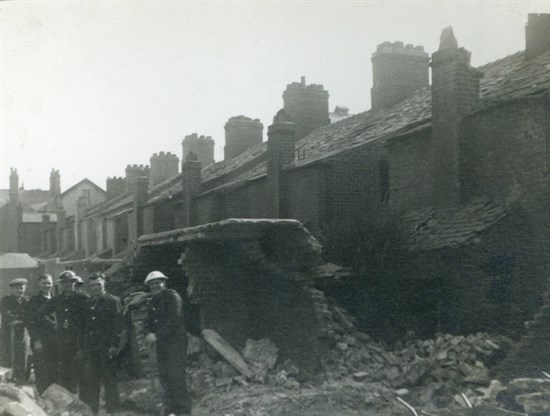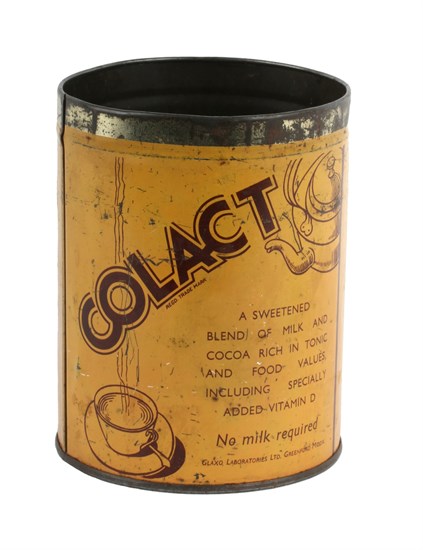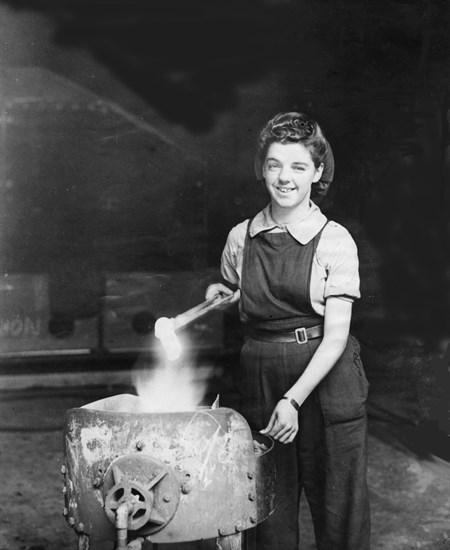Second World War
The main target for German bombing was the Vickers shipyard and engineering works. The works at Vickers, the docks and the railway all received direct hits, though the damage was not great enough to cause serious disruption. Barrow’s close-knit terraces, near the traditional workplaces, caught most of the bombing and a few strays landed on the town’s outskirts. but the whole population was affected by the war with rationing, making modifications to houses and flats to combat the effects of bombing, air raids by the Luftwaffe, deaths, evacuation of children, call-up to the armed services and working for war production.
During the war the shipyard built big ships such as Pioneer and Majestic, small destroyers and numerous submarines; merchant ships were armed and a wide range of engines and guns produced.
For a year there was little sign of the enemy. The greatest disruption was caused by heavy snowfalls and freezing temperatures at the end of January 1940. Schools were closed, roads blocked, trains suspended and water supplies frozen.
Then in September 1940 came the first serious raid, an incendiary attack on Salthouse during which a 5 year old boy became Barrow’s first civilian victim. It was in April and May 1941 that Barrow was bombed in earnest.


The main target for German bombing was the Vickers shipyard and engineering works. The works at Vickers, the docks and the railway all received direct hits, though the damage was not great enough to cause serious disruption. Barrow’s close-knit terraces, near the traditional workplaces, caught most of the bombing and a few strays landed on the town’s outskirts. but the whole population was affected by the war with rationing, making modifications to houses and flats to combat the effects of bombing, air raids by the Luftwaffe, deaths, evacuation of children, call-up to the armed services and working for war production.
During the war the shipyard built big ships such as Pioneer and Majestic, small destroyers and numerous submarines; merchant ships were armed and a wide range of engines and guns produced.
For a year there was little sign of the enemy. The greatest disruption was caused by heavy snowfalls and freezing temperatures at the end of January 1940. Schools were closed, roads blocked, trains suspended and water supplies frozen.
Then in September 1940 came the first serious raid, an incendiary attack on Salthouse during which a 5 year old boy became Barrow’s first civilian victim. It was in April and May 1941 that Barrow was bombed in earnest.
Spam Fritters Anyone?
Food supply and distribution were sensitive issues during the war. It had to be seen to be fair - and it was - although there was still a small black market for some goods.
As early as January 1940 there was sugar, butter and bacon rationing. By the following New Year butchers and sweet shops were being hit hard, though the Imperial Hotel still had oysters for sale. Most perishable goods were limited; hoarding was a criminal offence. There was, just about, enough food to go round but very little variety. One surprising consequence of the wartime diet was that the health of children actually improved. The Borough’s Medical Officer reported in 1943 that reduced sugar and sweets, more vegetables and a better balanced diet had resulted in a generally healthier school population.
"You didn’t get a lot of sweets! I can remember that. You didn’t have cakes or anything or chocolate biscuits."
"Most of my mornings were spent running from queue to queue, but being young I could do it. Corn beef was off the ration, so corn beef with onions was popular. We occasionally got a rabbit and whale meat, but that was fishy and no one liked it.”
"We were allowed to keep hens in our backyards and I fed them scraps, potato peelings and a few oats. We got quite a few eggs from those hens.”


"Just work and play, just work and play"
Barrow became home to bombed-out Londoners, American G.I.s, Polish airmen and many other nationalities. Women learnt new trades. People became used to blackouts, rationing, "making do” and "pulling together”. It was a mixture of fright, excitement, worry and boredom.
As in the Great War, Vickers professions and crafts were "protected”, meaning that skilled workers were exempt from call-up. Overtime was compulsory and workmen who repeatedly refused could be dismissed and drafted into the armed forces. Again as in the First World War, women entered this male preserve. This time, however, they were not confined to one area, but spread to almost all departments.
In February 1941 women between 16 and 45 had to register as "mobile” if they had no children living at home. This meant they could be directed to war work by the government. Many decided to work in Vickers – essential war work. For those with children an overnight nursery was set up at 242 Abbey Road.
There was a strong unionised atmosphere with very clear demarcation between roles. Strikes were widely considered unpatriotic but they did occur when workers felt that they were being pushed too much. For example, Vickers apprentices went on strike on 18 March 1941 for a 3d an hour increase.
"Shift work was the hateful part about it. At eighteen you didn’t want to be going to work from 2-10, when you wanted to go dancing, to enjoy yourself.”
"Well nobody liked the night shift because we were all nervous of the air raids which we got quite a lot of, and when the siren used to go we had to stop the machine and run for the air raid shelter which was quite a way off."
"Well it made me realise that I could do heavy work, that I could master big machines”
